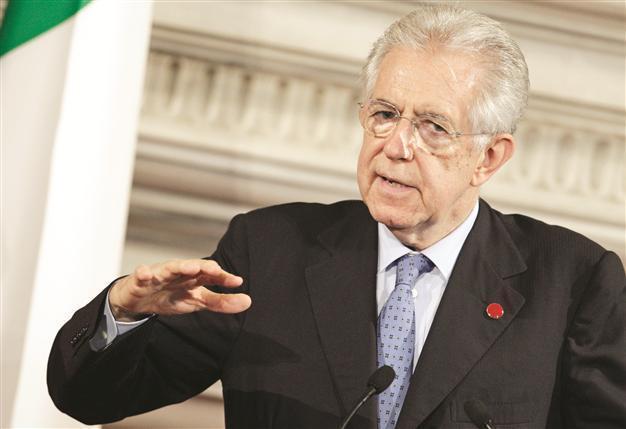Germany warns over ‘dangerous’ tone in debate on Europe’s future
BERLIN - The Associated Press

Italian Premier Mario Monti gestures as he speaks during a press conference. ‘The tensions accompanying the eurozone over the past years already bear the signs of a psychological dissolution of Europe,’ he says.AP photo
Germany’s foreign minister warned yesterday that arguments about European policy are taking on a “very dangerous” tone as worries mount about the future of the euro.Guido Westerwelle did not specify who his comments were aimed at. But they came after Italian Premier Mario Monti warned over the weekend of tensions that “bear the traits of a psychological dissolution of Europe,” and a regional official in a German governing party said Greece must leave the euro this year.
“The tone is very dangerous. We must take care not to talk Europe down,” Westerwelle said in a statement. He added that attempts to grab domestic political attention “cannot be the yardstick for our action in any European country, including Germany - the situation in Europe is too serious for that.”
Approaching state elections
Politicians from the Christian Social Union, the Bavaria-only sister party to Chancellor Angela Merkel’s Christian Democrats, have made particularly hardline comments in recent days.
Bavaria is due to hold state elections this time next year, shortly before German national elections.
Markus Soeder, the state’s finance minister and a CSU member, called in an interview published Sunday for Greece to leave the 17-nation eurozone before the year is out.
“An example must be made of Athens (to show) that the eurozone can show its teeth,” Soeder was quoted as telling the Bild am Sonntag newspaper. “The Germans can no longer be Greece’s paymaster ... further help to Greece is like pouring water into the desert.”
Bailing out eurozone strugglers hasn’t been popular in Germany, Europe’s biggest economy.
Westerwelle’s own Free Democrats - another junior partner in Merkel’s center-right coalition - have also talked tough on Greece. Vice Chancellor Philipp Roesler said recently that the idea of Athens leaving the euro has “lost its horror.”
The German government’s room for maneuver in the crisis is limited by the need for it to get Parliament’s approval for practically every rescue measure - something that the country’s supreme court has insisted on.
In his interview with the weekly Der Spiegel, published Sunday, Monti - who leads a government of technocrats - was quoted as saying that governments have to “educate” their parliaments as they try to reach agreements on the eurozone’s future. ’If governments let themselves be fully bound by the decisions of their parliaments without preserving any room for maneuver, Europe breaking apart would be more likely than closer integration,” he said, according to the report.
Westerwelle responded that parliamentary oversight of European policy could not be questioned.
“We need a strengthening, not a weakening of democratic legitimation in Europe,” he said.
The CSU was less diplomatic. Its general secretary, Alexander Dobrindt, told the daily Die Welt: “Mr. Monti clearly needs a clear announcement that we Germans will not be prepared to abolish our democracy to finance Italian debt.”
















